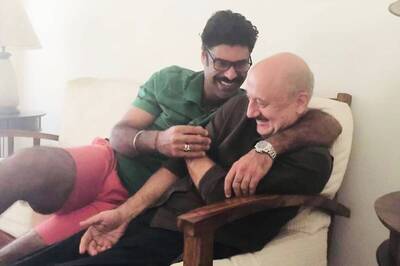
views
Kolkata: With the demise of Matua matriarch Binapani Devi on Tuesday night, the political rift within the community is likely to grow.
Several family members of the Matua matriarch are prominent in at least 14 constituencies in Bengal, where they are undeniably the deciding factor and can turn the tables for both TMC and BJP in the upcoming Lok Sabha polls.
Since Tuesday, political leaders from all camps, including PM Narendra Modi, CM Mamata Banerjee and BJP chief Amit Shah, have expressed their condolences.
Popularly known as ‘Boro Ma’ (elder mother), Binapani (100) was the binding force behind the unity of Matuas.
The widow of Pramath Ranjan Thakur (great-grandson of visionary Harichand Thakur), she had a huge sway over the Namashudra (Dalit) community, which migrated in large numbers from Bangladesh (then East Pakistan) after Partition.
Speaking to News18, political expert and litterateur Kapil Thakur said, “Both the BJP and Trinamool have managed to draw a political line in Boro Ma’s family. Trinamool had fielded her son Manjul Krishna Thakur in 2011 and made him a minister. Later, following differences, he resigned. The rift became prominent after his son, Shantanu Thakur, was arrested in a law and order case. Many are of the opinion that Shantanu’s incarceration was politically motivated by the ruling party. The BJP saw an opportunity in this and managed to win Shantanu’s confidence. Now Shantanu works for BJP.”
“I think with her demise, political rift in Thakurbari will be more open in public now,” he added.
In 1935, Binapani Devi married Pramath Ranjan Thakur, who was elected as a member of the West Bengal Legislative Assembly from the Hanskhali constituency in the 1962 as Indian National Congress’ candidate.
Pramath Ranjan Thakur was a prominent member of the Namasudra community and his great-grandfather, Harichand Thakur, was the founder of Hindu religious sect called Matua Mahasangha.
In 1947, Devi and Thakur migrated from Bangladesh (after partition) to West Bengal and settled in South Kolkata’s Ballygunge area.
In December 19, 1947, the couple bought a piece of land at Thakurnagar in North 24-Parganas district to provide shelter to those who migrated here from Bangladesh.
The land was bought as a cooperative under the name of ‘Thakurbari Land and Industries’ and they built India’s first private refugee colony for migrated people with all the basic facilities.
Though, few research papers are available about Binapani Devi but based on Nityananda Haldar’s diary (senior member of Matua Mahasangha) it was learnt that Binapani Devi and her husband bought the lands from ‘Rafiul Saheb’ and ‘Riaz Miyan’ in 1947. Located nearly 70 KM from Kolkata, Thakurnagar is now the headquarters of ‘Matua Mahasangha’.
Devi has three sons, of which Kapil Krishna Thakur and Mridul Krishna Thakur died in 2014 and 2016, respectively. Her younger son Manjul Krishna Thakur was a TMC MLA but he resigned. Manjul has two sons Subrata and Shantanu.
While Subrata is settled in Australia, Shantanu is the Saha Sanghadipati of All India Matua Mahasangha (AIMM). There are rumours that Shantanu may contest the Lok Sabha election on a BJP ticket from Bongaon Lok Sabha seat.
On February 2, 2019, Prime Minister Narendra Modi addressed a public meet in Thakurnagar, which falls under Bongaon Lok Sabha constituency.
With nearly 65-67 per cent Matua voters, Bongaon Lok Sabha is one of the seats (total Lok Sabha seats in Bengal is 42) which BJP and TMC both are eyeing to win by wooing the Matuas.
Not only Bongaon but there are at least 14 Lok Sabha constituencies where Matuas play an important role in Bengal politics. This includes Krishnanagar, Ranaghat, Malda North, Malda South, Burdwan East, Burdwan West, Silguri, Cooch Behar, Raiganj, Howrah and Joynagar. In all the constituencies, average voting percentage of Matuas is between 35-40 %.
Matuas are believed to be the key political force behind Mamata Banarjee that helped her ride to victory and oust the Left Front government after 34 years in 2011 Assembly elections. But with Binapani’s demise, BJP will surely look for securing a sizeable vote share in all the Matua-dominated areas.



















Comments
0 comment